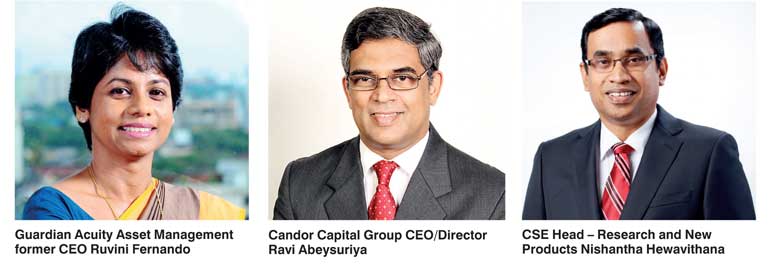Wednesday Feb 25, 2026
Wednesday Feb 25, 2026
Thursday, 26 October 2017 00:00 - - {{hitsCtrl.values.hits}}

For individual investors, knowing how to make the most of their financial assets can be a challenge given the complex nature of financial markets and investment vehicles therein. To share views on what retail investors need to be aware of when investing in Sri Lanka’s capital market, Shenali de Silva of the Economic Intelligence Unit interviewed Ruvini Fernando, former CEO of Guardian Acuity Asset Management Ltd.; Ravi Abeysuriya, Group CEO/Director, Candor Capital; and Nishantha Hewavithana, Head – Research and New Products at the Colombo Stock Exchange, who are members of the Ceylon Chamber of Commerce’s National Agenda Committee (NAC) on Finance and Capital. 
In the previous article, the group looked at options and tips for retail investors. In this second article of the two-part series, the group explores best practices for investing in the stock market.
At the outset of our discussion, Nishantha (CSE), stresses the importance of savings and smart allocation of savings when investing in the stock market. Echoing his sentiments Ravi states that; “For any investor I would recommend investing about 10% of your wealth in stocks. Asset allocation is extremely important, because when you diversify, certain things do well at different times.”
Always diversify your investments
Ravi, Ruvini and Nishantha all emphasise the need for diversifying investments and not keeping the proverbial eggs in one basket. Investors need to be mindful of ensuring that their investments are spread out across multiple industries in order to ensure that losses in one industry or company would not drastically affect the returns from all your assets. Furthermore, Nishantha draws on the classification of companies in the stock market and the limitation of such a classification.
Nishantha: “When we hear the words classification or industry classification or sector classification, what comes to our mind is a set of labels under which these companies fall. Currently what we have is a basic classification. For example, bank finance and insurance companies and classified together. There are about 60 odd companies in food, beverage and tobacco. This classification will not help you truly diversify. If you take Food, Beverage and Tobacco, we have put so many companies together, there could be food manufacturers, and there could be packaging companies. There could be companies that are related to the food, beverage and tobacco industry and their risk exposure could be different. That’s why we need to introduce a hierarchical classification.”
Avoid unnecessary risks, conduct comprehensive due diligence
Nishantha further states the importance of assessing the risk for individual investors and being cautious prior to blindly investing. Careful research and understand the impacts of investing in a particular company to the investors financial well-being is of vital importance.
Nishantha: “When it comes to risk, they should be concerned about the amount of risk that they’re willing to take. The level of risk a person is willing to take varies from individual to individual. For someone who has a lot of debt and mandatory payments, their ability to invest would be different to someone who doesn’t. The other aspect is the willingness. The risk analysis should be done based on four quadrants incorporating willingness and ability. These are – low ability and low willingness, low ability and high willingness. A common mistake individual investor’s do is only look at the last year’s or quarter’s earnings, industry profitability, if industry potential is high, and if the company has strong balance sheet. If all these indicators are good, they buy the stocks. That’s not a good decision, they should do one more thing before coming to a decision of purchasing. They should check if all these positive factors are reflected in the price. If these are overrepresented in the price, then it’s not a good investment.”
Be mindful of the company’s valuation, understand the underlying factors are driving its price
Nishantha states that individual investors should be mindful of the valuation of a company, given that stock prices are traded based on the demand for them, and could lead to losses if not evaluated properly.
Nishantha: “When you do the valuation, you realise that while the value of the stock is 65, it’s traded at 71, then you realise that it isn’t a good stock because the price is then determined by market factors such as demand and supply. This valuation part is critical, yet neglected.”
Furthermore, both Ravi and Ruvini draw on the importance of understanding the underlying drivers of the market and investing in companies when prices have fallen. However, as stated before, investors need to be mindful if these are high dividend yielding stocks to avoid making losses.
Ruvini: “It is very important for investors to understand the underlying drivers of particularly the stock market. If they can understand and we can make clear to them the underlying drivers of performance in the stock market. Then they should really get in when the market is low. Because what we see, if you take the top companies on the stock exchange, their profitability is still quite good. They’re well managed and their businesses are growing. Top line is growing, bottom line is stable or growing. But their stock prices have fallen due to external factors. But there’s nothing wrong with the company. Great time to get in and buy a good banking stock or a good trading company or a construction company or whatever. Because the underlying economics is really excellent. But due to external factors, share prices will come down. That’s the time you invest, and when the cycle turns up, you’re gonna make very good gain.”
Ravi: “There are high valued stocks with very good dividend yield. Stocks are extremely undervalued, it’s time to start investing. You have to carefully start picking the stocks that are going to do well. So what are the stocks that going to do well? High dividend yield paying stocks, and growth stocks that are likely to have a higher dividend in the future.”
Our takeaway from this interview is that it is better for investors to understand that stocks are a long-term investment rather than focussing on it as the ‘best bet for the day’. Careful evaluation of the company and comprehensive due diligence is essential for making the most of your investment.